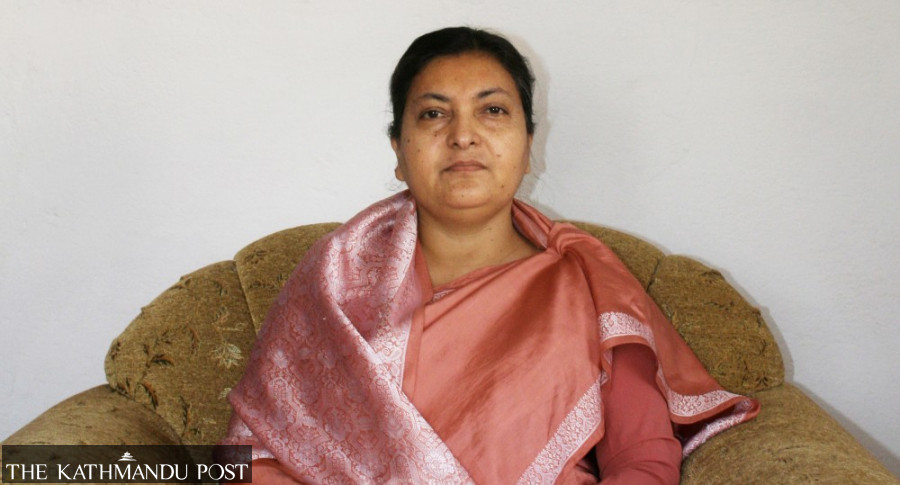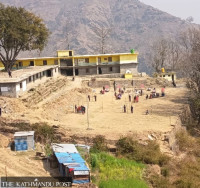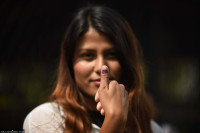National
Lawyers question President’s intent as hearing on House dissolution starts
The way Bhandari acted on May 21 makes it clear that she wanted Oli—and no other person—as prime minister, advocates argue. Hence she rejected Deuba’s claim.
Binod Ghimire
When Prime Minister KP Sharma Oli dissolved the House of Representatives last December, lawyers arguing on behalf of the 13 petitioners demanding its restoration had questioned his intention. They said that Oli dissolved the House without exhausting all the constitutional provisions for forming a government.
Months later, after Oli dissolved the House for a second time on May 21, lawyers on Wednesday questioned President Bidya Devi Bhandari’s intention for endorsing the dissolution recommendation.
The House dissolution recommendation on May 21 followed President Bhandari’s move of disqualifying claims by Nepali Congress President Sher Bahadur Deuba and Oli himself to form a government under Article 76 (5) of the constitution.
“Bhandari’s rejection of Deuba’s claim makes it clear that she didn’t want anybody except KP Sharma Oli as prime minister,” said advocate Govinda Bandi on Wednesday while arguing on behalf of the petitioners against the House dissolution.
The final hearing on the House dissolution began on Wednesday. As many as 30 petitions, including one by the opposition alliance led by Deuba, against the House dissolution have been filed at the Supreme Court.
The Constitutional Bench has said it would first settle the petition filed by Deuba, which is backed by 146 lawmakers, including 23 of Oli’s CPN-UML, of the dissolved House.
The opposition alliance has demanded that the House be restored and Deuba appointed prime minister because he had presented the signatures of 149 lawmakers before the President on the afternoon of May 21, laying claim to the government.
After Prime Minister Oli lost a confidence vote on May 10, the President appointed him prime minister again on May 13 as per Article 76 (3) of the constitution.
Oli needed to win the confidence of the House within 30 days—by June 12—as per Article 76 (4). But instead of seeking a vote, Oli on May 20 recommended that the President call for the formation of a new government as per Article 76 (5).
On May 21, Deuba staked claim to government with signatures of 149 lawmakers—61 of the Nepali Congress, 49 of the Communist Party of Nepal (Maoist Centre), 26 of a faction of the UML, 12 of a faction of Janata Samajbadi Party and one from Rastriya Janamorcha.
However, Oli too laid claim to government, saying he had the support of all 121 lawmakers of his party and all 32 members of the Janata Samajbadi Party.
Near midnight of May 21 Bhandari, however, invalidated both the claims saying they were “insufficient”. An emergency Cabinet meeting recommended the dissolution of the lower house and holding mid-term polls on November 12 and November 19.
The President swiftly endorsed it.
After the President invalidated his claim under Article 76 (5), Deuba and 145 other lawmakers went to the Supreme Court on May 24.
When arguments began on Wednesday, lawyers questioned the impartiality of the Office of the President.
“The President gave extra-constitutional justification to invalidate the claim of Nepali Congress President Deuba who had the support of 149 lawmakers,” said Bandi. “It shows she wanted to see Oli as a prime minister based on Articles 76 (1), 76 (2), 76 (3) and 76 (5).”
Article 76 (1) allows the formation of the government by the leader of the party that has a majority in the House, Article 76 (2) allows for a coalition government, and Article 76 (3) allows the formation of a minority government by the leader of the largest party in the House. Article 76 (5) allows any lawmaker who can potentially prove a majority to lead a government.
While questions have been asked about Oli’s decision to lay claim to government a day after he had said there were no circumstances for him to secure a vote of confidence, lawyers now are questioning President Bhandari’s integrity.
The plaintiffs’ lawyers claim that the President endorsed the House dissolution well past midnight despite knowing that Deuba’s claim was valid.
“The dissolution was a result of an ill-intention,” said senior advocate Khamba Bahadur Khati. “The court should issue a writ [of mandamus] to appoint Deuba, who had the support of 149 lawmakers [of the dissolved House], prime minister.”
Lawyers argued that the signatures of 149 lawmakers were enough for Bhandari to appoint Deuba prime minister and if she had doubts about the misuse of the signatures, she could have left the matter to the House to decide.
Had Deuba been appointed prime minister, he would have to have secured a vote of confidence within 30 days of appointment. Experts on constitutional matters argue that the President robbed the House of its prerogative.
Before the final hearing began on Wednesday, the Office of the President, the Office of the Prime Minister and Council of Ministers and the secretariat of the Speaker had submitted their written clarifications on June 17, as per the court’s June 9 order.
While President Bhandari’s clarification argued that any action carried out by the President cannot come under a judicial review, Oli argued that government formation is a political process and that the court cannot decide on the matter. Speaker Agni Prasad Sapkota, on the other hand, called the House dissolution unconstitutional.
Lawyers of the plaintiffs, however, said on Wednesday that the President had encroached upon the jurisdiction of the legislature by rejecting Deuba’s claim to form a government.
Senior advocate Shambhu Thapa said that nobody has the authority to bar the people’s representatives from staking claim to form a government.
“Who are you [to reject] when 149 lawmakers signed for Deuba?” he asked, referring to the President. “There is a floor test in Parliament to decide if someone holds a majority.”
Senior advocate Mahadev Yadav said Oli’s claim that he had support of 153 lawmakers as per their respective party’s decisions is flawed, as Article 76 (5) allows individual lawmakers to make their choices.
“Article 76 (5) doesn’t entertain the Political Parties Act-2017 which means the party whip is not applicable,” said Yadav.
He argued that the provision of Article 76 (5) was introduced in the Constitution of Nepal to allow individual lawmakers to make efforts to form a government so that the House doesn’t face untimely dissolution.
However, when Chief Justice Cholendra Shumsher Rana asked if there was any documentation of discussions in the Constituent Assembly on the article, so as to know the legislative intent, Yadav said he was unaware of it.
“The President should have rejected Oli’s claim,” said senior advocate Badri Bahadur Karki. “The prime minister and the President who should be finding solutions to problems in the country are actually creating problems.”
Six of the lawyers arguing on behalf of the plaintiffs presented their arguments for four hours on Wednesday.
The two sides have been allotted 15 hours each to present their cases. The four members of the amicus curiae have 30 minutes each to give their expert opinions.
The hearing will continue on Thursday and will go on until all arguments are complete.
“The plaintiffs’ lawyers will conclude their arguments in the next two days,” Kishwor Poudel, a communication expert at the Supreme Court, told the Post. “Then comes the turn of the defendants.”




 27.41°C Kathmandu
27.41°C Kathmandu














